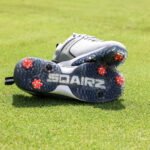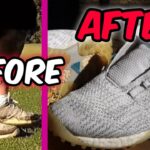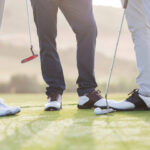Yes, you can wear golf shoes on concrete. However, it’s not recommended due to potential damage to the spikes and discomfort.
Golf shoes are designed for the golf course, providing traction and stability on grass. Wearing them on concrete can wear down the spikes or cleats, reducing their effectiveness on the course. It can also cause discomfort since these shoes are not made for hard surfaces.
For optimal performance and longevity, use golf shoes only on the intended surfaces. If you need footwear for walking on concrete, consider athletic or casual shoes designed for such environments. This approach ensures your golf shoes stay in good condition, ready for your next round of golf.
Types Of Golf Shoes
Golf shoes come in various styles and designs. Each type offers specific benefits for different playing conditions. Understanding the types can help you choose the right one for your needs. Here, we will explore the key differences between spiked and spikeless golf shoes and their material differences.
Spiked Vs. Spikeless
Spiked golf shoes have cleats on the sole. These cleats provide extra grip on the grass. They are perfect for wet or hilly courses. The spikes can be metal or plastic. Metal spikes offer more grip but can damage greens.
Spikeless golf shoes have a flat sole with small rubber studs. These studs provide grip but are gentler on the course. Spikeless shoes are more versatile. You can wear them on and off the course. They are also lighter and more comfortable for walking.
| Feature | Spiked Shoes | Spikeless Shoes |
|---|---|---|
| Grip | High | Moderate |
| Course Impact | Can Damage | Gentle |
| Versatility | Golf Only | Multi-purpose |
| Comfort | Stiffer | Softer |
Material Differences
Golf shoes come in different materials. Each material offers unique benefits. Here are the most common ones:
- Leather: Durable and water-resistant. Provides a snug fit. Often used in high-end golf shoes.
- Synthetic: Lightweight and breathable. Less expensive but may not last as long.
- Mesh: Very breathable and lightweight. Ideal for hot weather but less water-resistant.
Choosing the right material depends on your needs. Leather is great for durability and water resistance. Synthetic materials are good for affordability and lightness. Mesh is perfect for breathability in hot weather.

Credit: www.youtube.com
Comfort And Performance
Many golfers wonder if they can wear their golf shoes on concrete. Comfort and performance are crucial factors. This section will explore these aspects in detail.
Cushioning And Support
Golf shoes are designed for grassy terrains. They provide excellent cushioning and support on the course. Wearing them on concrete can affect their comfort level. Concrete is a hard surface. It can cause discomfort if your shoes lack proper cushioning. Golf shoes with extra padding can help. They offer better support for your feet on hard surfaces.
Consider the shoe’s insole. An insole with good arch support can make a difference. Shoes with removable insoles allow you to add extra cushioning. This can enhance comfort on concrete.
Traction On Concrete
Golf shoes have spikes or cleats. These provide traction on grass. On concrete, spikes may not grip well. This can lead to slipping or uneven walking. Some golf shoes have rubber soles. These offer better traction on hard surfaces. Rubber soles can prevent slips and ensure stability.
| Feature | Grass | Concrete |
|---|---|---|
| Spiked Soles | Excellent Traction | Poor Traction |
| Rubber Soles | Good Traction | Better Traction |
- Check the shoe’s sole material.
- Consider rubber soles for better grip.
- Avoid wearing spiked shoes on concrete.
Durability Considerations
Wondering if you can wear golf shoes on concrete? Let’s explore the durability considerations. Golf shoes are designed for grassy terrains. Concrete can be harsh on them. Understanding the impact on durability is crucial.
Wear And Tear
Golf shoes face more wear and tear on concrete. The hard surface can damage the soles. Soft spikes can wear down quickly. The shoe materials may degrade faster too.
Concrete can cause scuffs and scratches. This affects the shoe’s appearance. The constant friction reduces the shoe’s lifespan. Regular use on concrete is not ideal.
Longevity Of Spikes
The longevity of spikes is also a concern. Spikes are made for grass, not concrete. They can wear out fast on hard surfaces. Metal spikes can get dull. Soft spikes can flatten and become useless.
Replacing spikes frequently can be costly. The shoe’s performance on the course may decline. Proper care and limited use on concrete can help.
Safety Aspects
Wearing golf shoes on concrete might seem convenient. But, it comes with safety concerns. These shoes are designed for grassy terrains, not hard surfaces.
Slip-resistance
Golf shoes feature spikes or dimpled soles. These provide traction on grass. On concrete, they can be slippery. This increases the risk of falls. Always check the sole type before walking on concrete.
Potential Injuries
Walking on concrete with golf shoes can hurt your feet. The hard surface can cause blisters and sore spots. The rigid spikes can lead to ankle twists. This can result in more severe injuries.
| Risk | Details |
|---|---|
| Slipping | Soles designed for grass can slip on concrete. |
| Foot Injuries | Hard surfaces cause blisters and sore spots. |
| Ankle Twists | Spikes can lead to ankle twists. |
For safety, avoid wearing golf shoes on concrete. Choose shoes with flat, non-slip soles.
Impact On Concrete Surfaces
Wearing golf shoes on concrete can affect both the shoes and the surface. Understanding these impacts can help you make an informed decision.
Damage To Pavement
Golf shoes have spikes or cleats designed for grass. These spikes can scratch and chip concrete surfaces. Over time, this can lead to noticeable wear and tear. Concrete may develop small dents or scratches from repeated contact with golf spikes. This damage not only looks bad but can also weaken the concrete.
Noise Levels
Walking on concrete with golf shoes can be noisy. The spikes make a loud clicking sound with each step. This noise can be disruptive in quiet areas. It’s important to consider the environment when wearing golf shoes on concrete.

Credit: www.pinterest.com
Alternatives To Golf Shoes
Golf shoes are perfect for the golf course. Yet, they aren’t great on concrete. If you need alternatives, there are good options. Let’s explore some of them below.
Sneakers
Sneakers are a popular choice. They offer comfort and support. This makes them suitable for walking on concrete. Many brands offer cushioned soles. This helps reduce foot fatigue. Sneakers also come in various styles. You can easily find one that fits your taste. Below is a table comparing different features of popular sneaker brands:
| Brand | Comfort | Style | Durability |
|---|---|---|---|
| Nike | High | Modern | High |
| Adidas | High | Sporty | Medium |
| Reebok | Medium | Classic | Medium |
Cross-training Shoes
Cross-training shoes are another great alternative. They are designed for various activities. This includes walking and running. They provide excellent arch support. This is crucial for walking on hard surfaces. Cross-training shoes have durable soles. This makes them last longer on concrete. Here are some benefits:
- Multi-purpose use
- Good arch support
- Durable soles
Cross-training shoes also offer good traction. This helps prevent slips. They are often lightweight. This reduces strain on your feet. Here’s a brief comparison:
| Feature | Cross-Training Shoes | Golf Shoes |
|---|---|---|
| Arch Support | High | Low |
| Durability on Concrete | High | Low |
| Weight | Light | Heavy |
Expert Tips
Wearing golf shoes on concrete surfaces can be tricky. Expert tips can help you make the right choice. This guide will cover proper usage and maintenance advice. Ensure your golf shoes last longer and remain comfortable.
Proper Usage
Golf shoes are designed for grass and turf. Concrete surfaces can damage them. Here are some tips for proper usage:
- Avoid walking long distances on concrete. It wears out the spikes.
- Use spikeless golf shoes if you must walk on concrete. They offer better grip.
- Change into regular shoes after your game. It preserves your golf shoes.
Maintenance Advice
Proper maintenance extends the life of your golf shoes. Follow these tips to keep them in top condition:
- Clean them after each use. Remove dirt and grass.
- Check the spikes regularly. Replace worn-out spikes.
- Store them properly. Use a shoe bag or box.
- Keep them dry. Moisture can damage the material.
Here’s a quick maintenance table:
| Task | Frequency |
|---|---|
| Cleaning | After each use |
| Spike Check | Monthly |
| Proper Storage | Always |
| Drying | After wet conditions |
Credit: www.tiktok.com
Frequently Asked Questions
Can You Wear Golf Shoes On Concrete?
Yes, you can wear golf shoes on concrete. However, it may damage the spikes or soles. Soft spikes are better suited for concrete.
Are Golf Shoes Comfortable On Hard Surfaces?
Golf shoes are generally less comfortable on hard surfaces compared to athletic shoes. They are designed for grass, not concrete.
Do Golf Shoes Last On Concrete?
Wearing golf shoes on concrete can reduce their lifespan. The hard surface wears down the spikes and sole quicker.
What Type Of Golf Shoes For Concrete?
If you must wear golf shoes on concrete, choose spikeless ones. They offer better durability and comfort on hard surfaces.
Conclusion
Wearing golf shoes on concrete can damage both the shoes and the surface. Opt for regular sneakers instead. Proper footwear ensures comfort and longevity. Always consider where you’ll be walking before choosing your shoes. Protect your investment and your feet by making the right choice.






